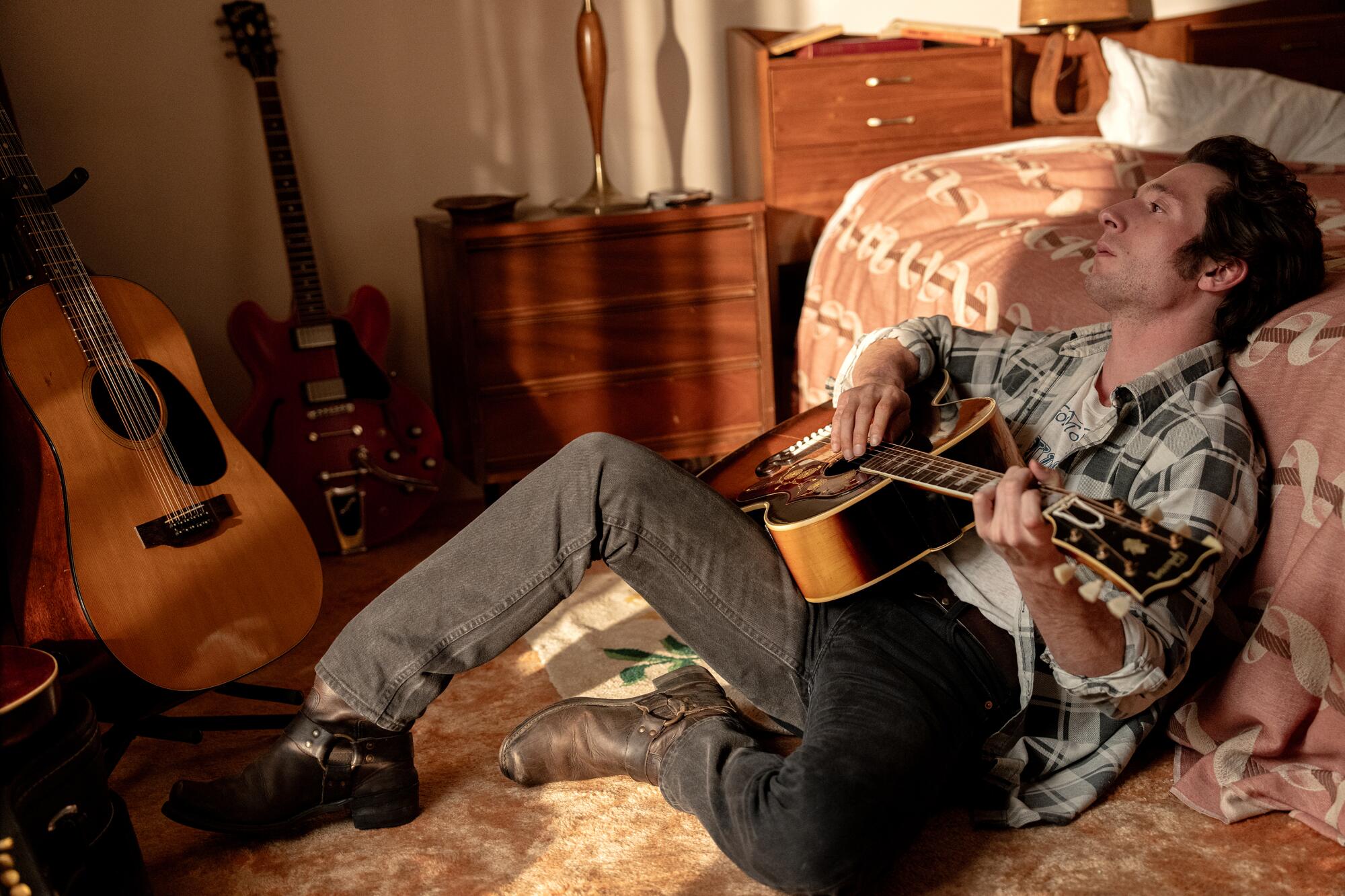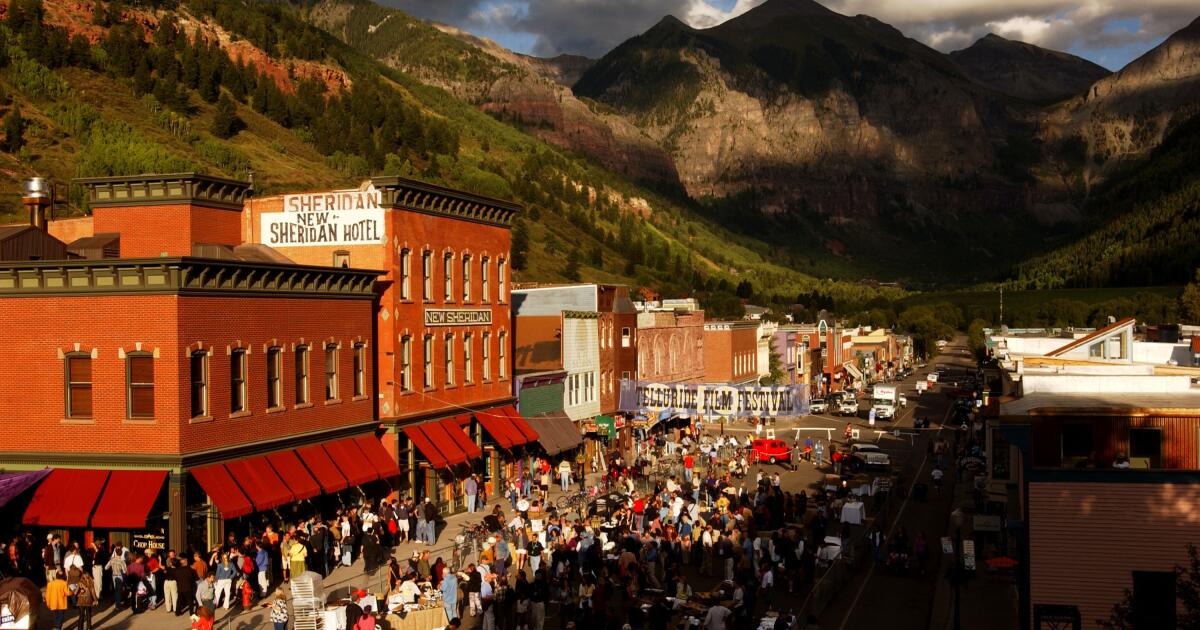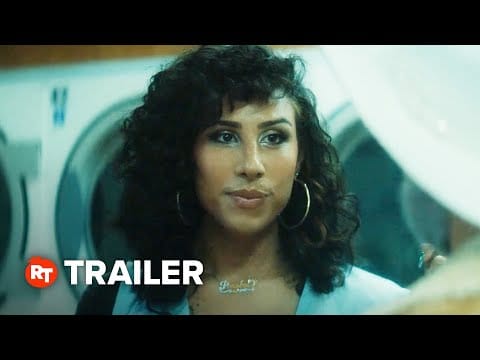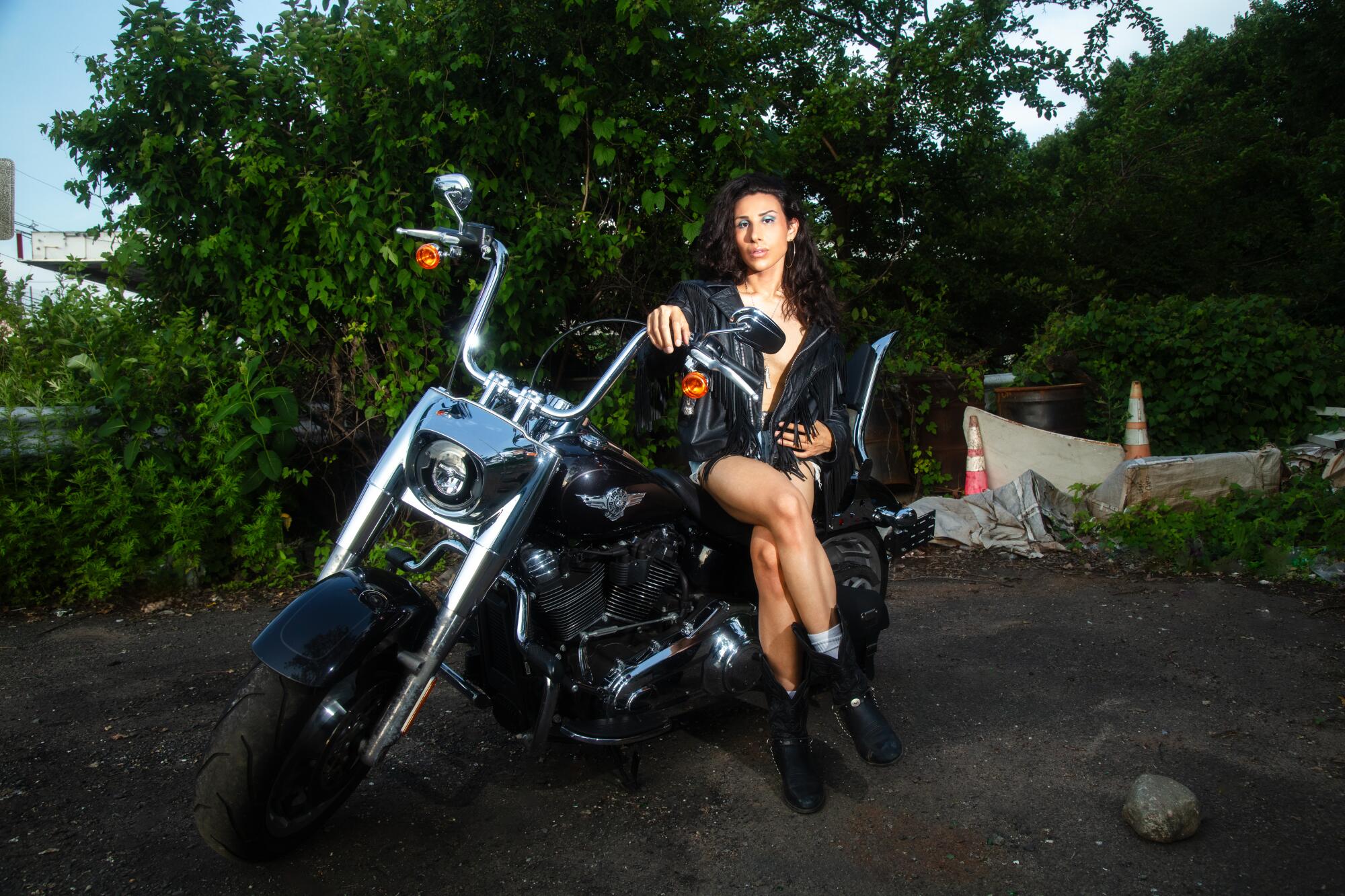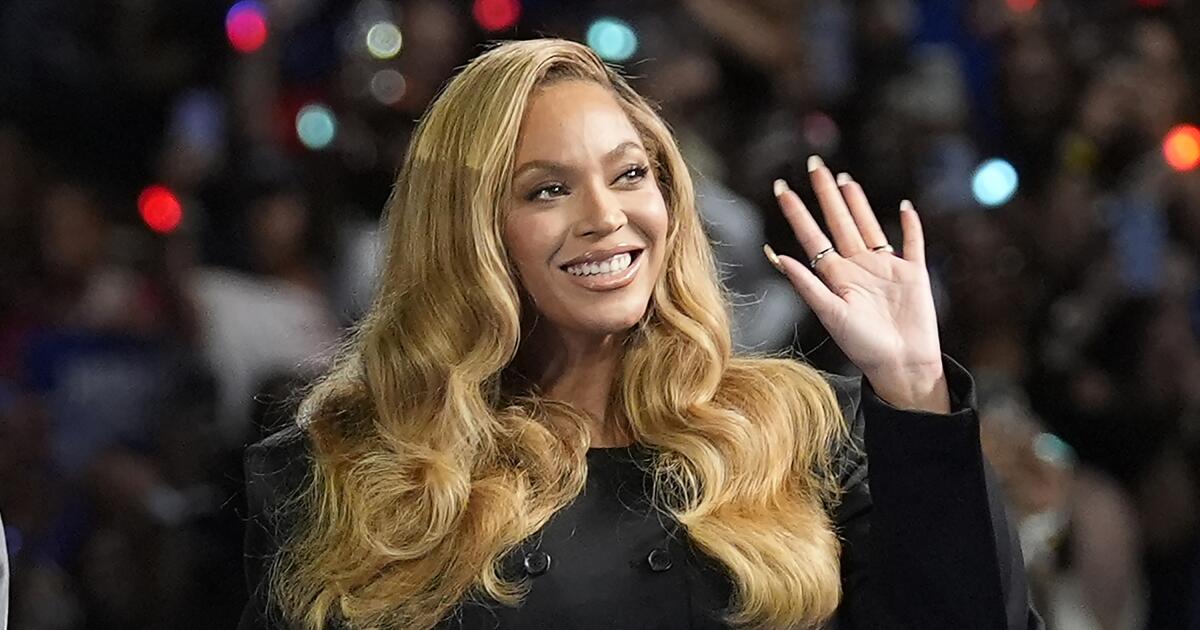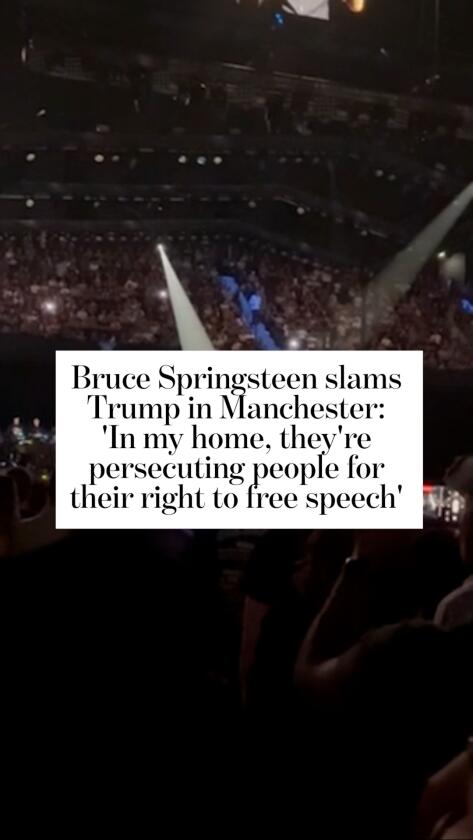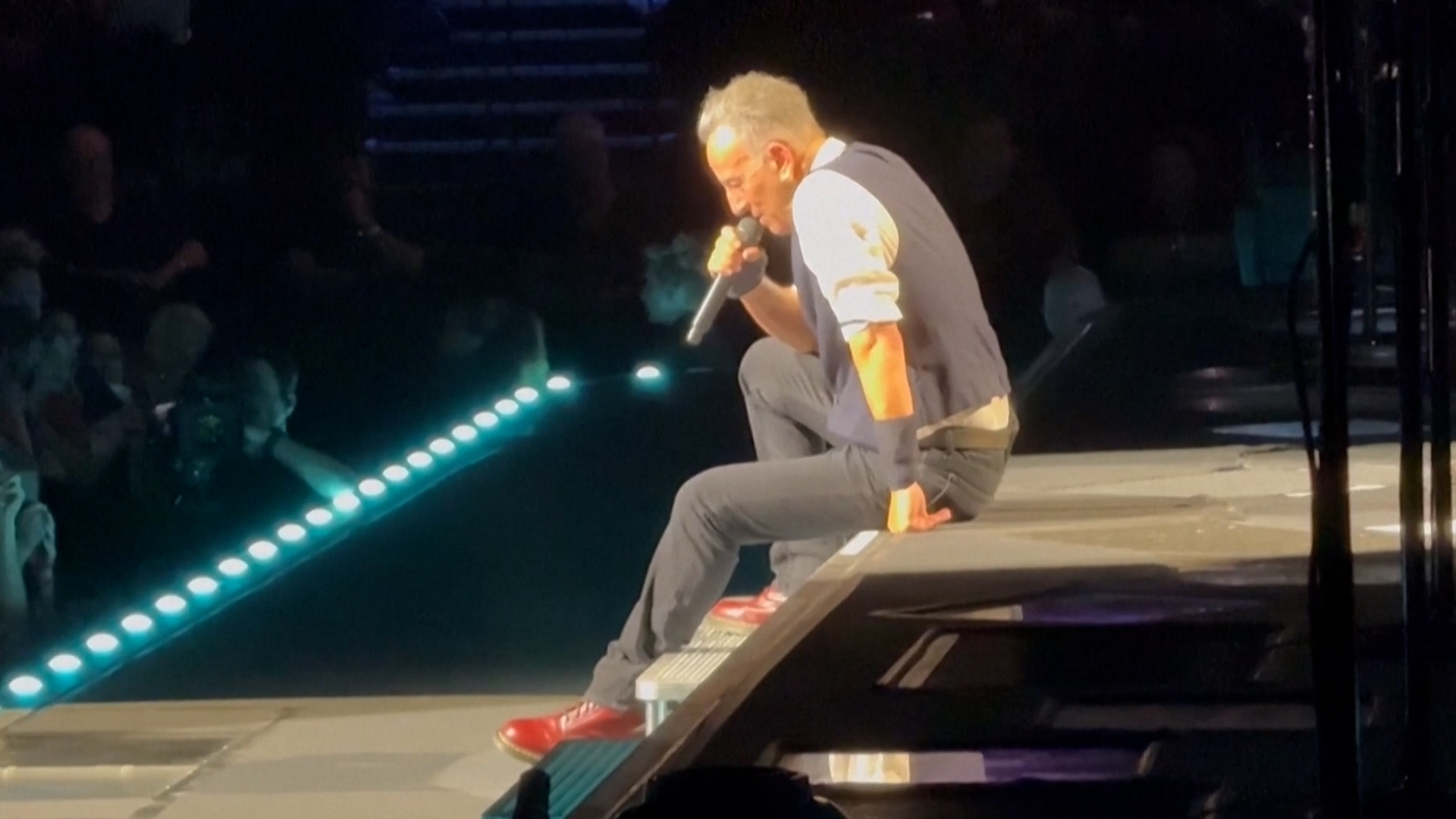Jeremy Allen White on becoming Bruce Springsteen in ‘Deliver Me From Nowhere’
TELLURIDE, Colo. — Jeremy Allen White asked all the questions any normal human being would ask when offered the chance to play Bruce Springsteen in “Springsteen: Deliver Me From Nowhere.” In theaters Oct. 24, it’s a movie that examines a slice of the rock legend’s career when he was battling depression and creating 1982’s incomparable exploration of alienation “Nebraska,” a record he didn’t know he was making when he recorded the songs on a primitive four-track tape machine in a rented New Jersey home. It turned out to be his favorite of all his albums.
Most of those questions could be boiled down to: Why me? White didn’t know how to play the guitar. He loves to sing but would never call himself a singer. And while he has a relationship with an audience, particularly those who have white-knuckled their way through his Emmy-winning work as Carmy, the talented and troubled chef on “The Bear,” he says it’s a far cry from the bond Springsteen has forged with his fan base for the past 50-plus years.
“The relationship a musician has with fans is so intimate,” White, 34, tells me the morning after the movie had its world premiere at the Telluride Film Festival. “You listen to him in the car, you go to see him live. He’s there in your ear and it’s just the two of you. You feel like you’re being spoken to. Bruce is so important to so many people. It was daunting. I didn’t want to disappoint.”
By the time we talked, though, White was well past any anxiety about disappointing, if only because he had the approval of the person who mattered the most: Springsteen himself.
“Jeremy tolerated me and I appreciated that,” Springsteen said at a festival Q&A, suggesting that his input on the movie was ongoing and significant — and also welcome. He noted that it was easy to sign off on director Scott Cooper’s vision for the movie, which, with its narrow focus on the deep dive of “Nebraska,” he called an “antibiopic.”
“And I’m old and I don’t give a f— what I do,” Springsteen added, laughing.
White and I are sitting in the sun outside his hotel, basking in the warmth the day after a steady rain. Wearing a battered Yankees cap, jeans, boots and a blue pullover, he’s sporting the casual uniform of the festival, if not the Boss himself. White asks if I mind if he lights an American Spirit. He reaches for his lighter. The premiere is over and his mood is light. We dive right in.
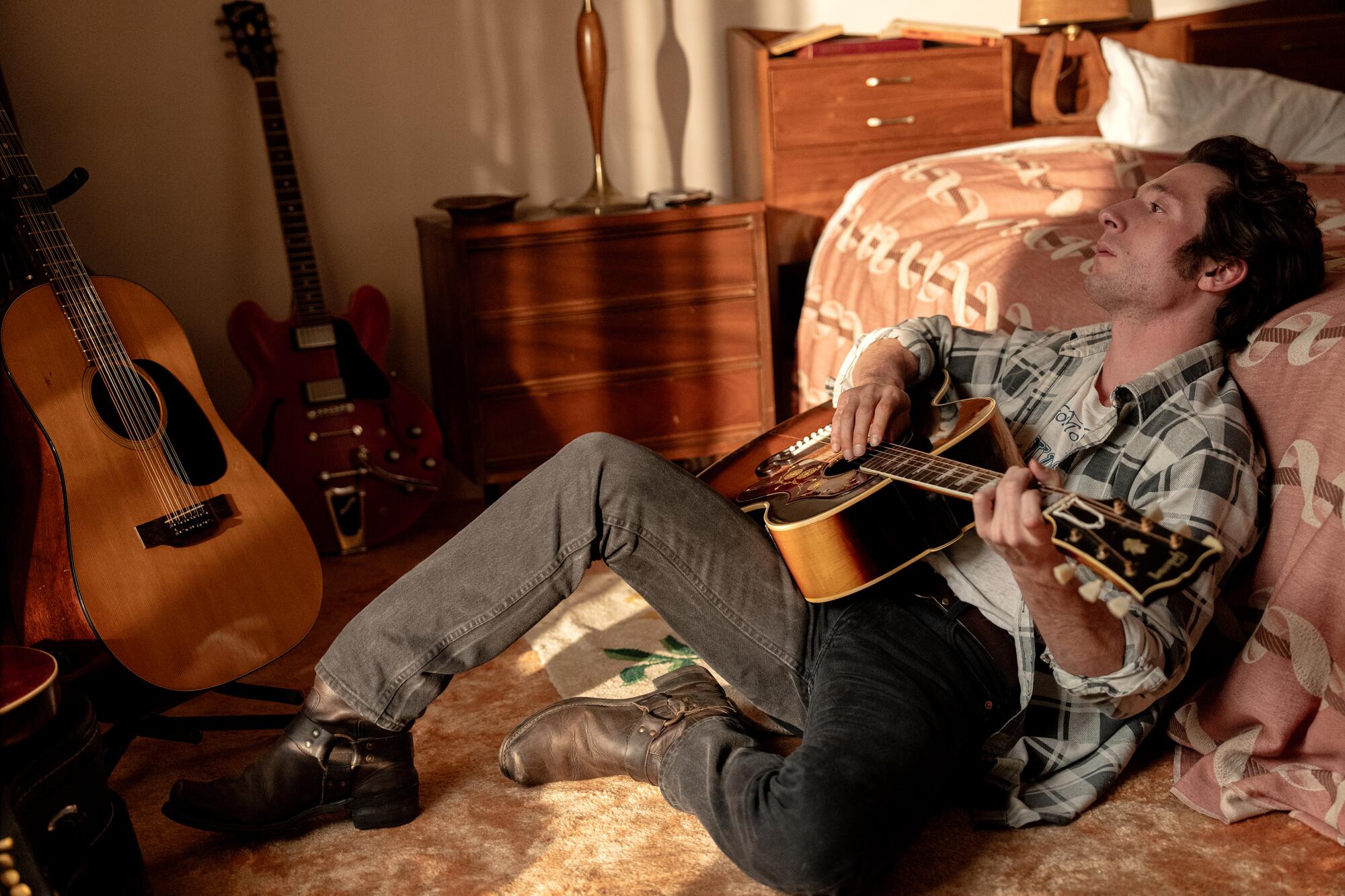
Jeremy Allen White in the movie “Springsteen: Deliver Me From Nowhere.”
(Macall Polay / 20th Century Studios)
Was there an immediate point of connection with Springsteen?
The more I talked with him, the more I learned. And at the point in his life we show in the movie, he was feeling so fraudulent. Not in his work, but as a human. He felt like he was being caught in a lie all the time. And I don’t want to speak for all actors, but I’ve certainly dealt with that kind of feeling.
It feels like there’s a line between your Springsteen and Carmy on “The Bear,” two men carrying generational trauma and emotional baggage they have no idea how to deal with. Do you see that?
For sure, you can draw that line. They’re cousins. And they’ve both got their art, something they feel confident about. What Bruce was feeling in his relationship with his father and the environment he grew up in, is he felt incredibly unsafe. And that made it difficult for him to trust people and form real connections. For a long time, the only connection he felt was in that three hours he spent on stage.
But then what do you do the rest of the time?
Absolutely. And I’m familiar with those feelings. But my home life as a child was more loving and supportive, so I had to do some creative work to find that tether to Bruce.
You mentioning Springsteen’s dad just popped a thought into my head. Is Carmy’s dad alive?
[Long exhale] We don’t know. That’s a decision that’s up to [showrunner] Chris [Storer].
It’s above your pay grade.
Well above.
You’re really good at playing men who have trouble articulating their feelings, which puts a lot of weight on your shoulders to convey an interior life through close-ups. Do you like that kind of acting?
I do. You have to have an understanding. The camera knows. If you’re just staring at a wall and you don’t have anything going on, the camera will know. The audience will, too.
You do also get to rock out and sing “Born to Run” and “Born in the U.S.A.” How did your vocal chords feel afterward?
I spent an afternoon singing “Born in the U.S.A.” and I got a migraine and I lost my voice. I saw Bruce afterward and he asked, “What’d you do today.” And I said [affecting a hoarse voice], “Uh, I recorded ‘Born in the U.S.A.’” And he smiles and says, “Sounds about right.”
Most of your singing is the “Nebraska” songs, these delicate acoustic songs about despairing characters who have lost hope. Putting across their stories in these songs feels like its own imposing challenge.
I was so focused on just sounding like Bruce and my coach, Eric [Vetro], asks, “What are you singing about? What’s the story? Where’s Bruce coming from? Is he singing from his perspective? Is about his childhood? Is he playing a character?” All these questions that, for an actor, should be right at the front of mind. Because I was so anxious about sounding like him, I found myself blocked by the real thing, which was: How can I just sing the song as honestly as possible?
What song was the breakthrough?
“Mansion on the Hill.” Bruce listened to it and said, “You do sound like me. But it’s you singing the song.” And that gave me permission, not just in recording the music, but making a film where I could tell his story but not be afraid to bring myself to it.
Did you have a favorite song?
Probably “My Father’s House.” It seemed like a warning for me. There’s regret in it. What I heard is a song about a young man not wanting to regret that he didn’t reach out for his father, who he had a love and connection with earlier. There was an immediacy to it, which you then see with Bruce and his father in the film.
Did it make you want to call your dad?
I called him right after recording that song in Nashville. Like many fathers and sons, we have a loving relationship, but we’ve also gone through periods where things have been difficult and it was hard to communicate. Making this film and singing this song has given me another perspective. It also coincides with getting older and having children of my own.
I’m glad you made the call. You can’t have those conversations after a certain point.
That’s what I mean about the warning of that song.
You told me yesterday that you and Springsteen had a debate about “Reason to Believe.” What was the source of the disagreement?
It’s the last song on the album and Bruce says people confuse it as being hopeful. He says that’s not correct. The song is about a woman whose husband has left her and she stands at the end of the driveway every day, waiting for him to come home. And I hear that, and I think, “Oh, that’s real love. That’s romance. Someone’s gonna drive down that road at some point.”
Either that or this poor woman is just going to be walking up and down her driveway the rest of her life.
And no one’s gonna be there. It depends how your ear is on a song.
But you choose to believe.
I choose to walk to the end of the driveway. Absolutely.
Would you call yourself an optimist?
No. [Laughs] Not really.
“Nebraska” came out in 1982 and was informed by the idea that there was a growing divide between the wealthy and the poor and that what we think of as the American Dream was becoming more elusive. Where do you think the album sits more than four decades later?
People are angry. That’s what seems to define our country right now. Anger. And it doesn’t seem to be going away. The songs on “Nebraska” are still going to be speaking to us four decades from now. They’re timeless.
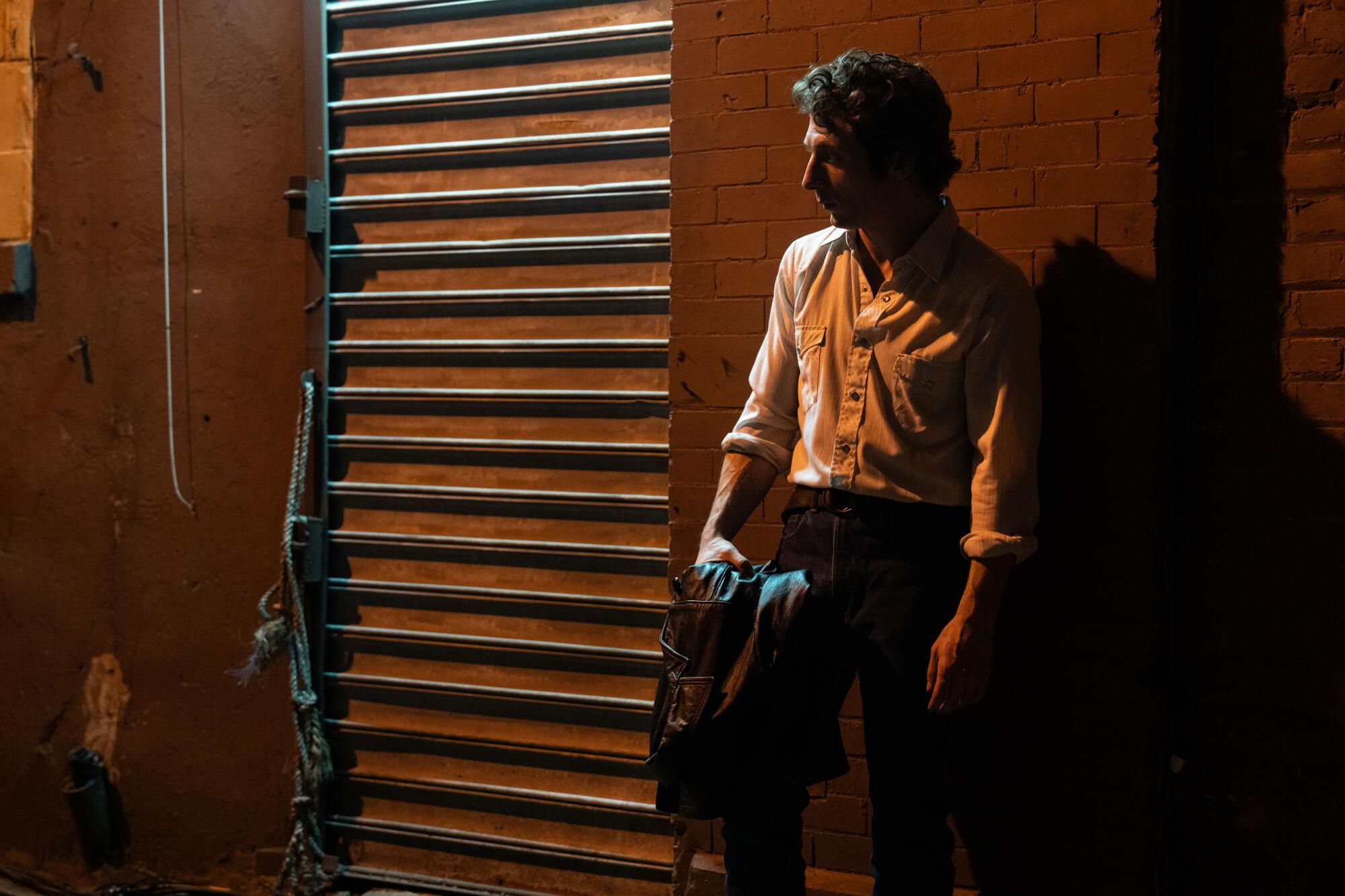
Jeremy Allen White in the movie “Springsteen: Deliver Me From Nowhere.”
(Macall Polay / 20th Century Studios)
Did your early dance background help you with the physicality of the role, the way he carries himself on stage or even just walking around?
For sure. Finding the way he holds his gravity was important. I put little lifts in the boots and that made my posture change, my legs a little longer. Wearing the pants up to here [he points to a spot above his hips], that gets your gravity in your belly button, where I’m crouched over all the time.
There’s a lot of scenes in diners where he’s sitting with one arm over the back of the booth …
… like he’s on his way out almost all the time. One foot in, one foot out.
Musician friends turned you on to “Nebraska” in your early 20s. What music were you listening to then?
My folks are a little older so I grew up listening to a lot of music that Bruce listened to — Sam Cooke, Otis Redding, the Beatles, the Stones, Aretha Franklin.
Your parents had a strong record collection.
Still do. And I grew up in in Brooklyn in the ’90s, so I got really heavy into hip-hop in my teenage years. I discovered Nas and Jay-Z and Big L and Wu-Tang. Tribe. De La Soul. And then I was around for an exciting time in the New York scene. I was young so I couldn’t really experience it, but the Strokes were coming out and LCD Soundsystem. I felt lucky to be close that stuff as it was happening.
The way you’re talking about all this, it feels like music is a fundamental part of your life.
Absolutely. I love that it’s always with you. I’ve taken a couple of cross-country trips, and I love putting on Motown. I go through periods where I listen to the same 20 songs for a couple of weeks. But then I’ve got thousands of “liked” songs. And the nice part about a long drive is you can shuffle that and it’s like you’re traveling in time. I love getting to visit past versions of myself through music.
Springsteen takes an eventful cross-country trip in the film. What’s your most memorable one?
I did one by myself when I was about 24. I thought I was going to give myself about two weeks to go from New York to L.A. The first week was great. I was enjoying my solitude, listening to a lot of music. Then when I hit Utah, I got incredibly lonely.
Did the landscapes get to you?
Maybe. I had a certain amount of anonymity, which I enjoy on a road trip. You don’t know anybody in these towns and that allows you to be whoever you want to be, passing through. I remember getting to Utah and just being desperate to see somebody who knew who I was. And I got a flat in St. George, Utah. It was a disaster. My phone had died. I didn’t have a spare. I was out on the side of the road trying to borrow somebody’s phone. I took that as a sign. After I got it repaired, I raced to have dinner with a friend, because I felt this this crazy loneliness.
Springsteen says everyone has their “genesis moment,” an experience that charts your path. His was watching Elvis Presley perform on “The Ed Sullivan Show” in 1956. What’s your genesis moment?
I had been dancing on stage but I didn’t act until I was 14 when I got up in front of a group in middle school. I had this great teacher, John McEneny, and he was having us do this improvisational exercise — two characters, one speaking, one quiet. And my friend, Yael, was playing a mother and I was playing her child who didn’t know how to speak yet. So I wasn’t speaking, like so much of my work [Laughs].
It’s Carmy’s genesis moment too.
Yes. And I remember feeling a presence. I had a hard time focusing as a child, a hard time being present. Still do. But I remember even in silence feeling so at ease and present. And of course I remember the eyes. And even without me doing anything or speaking, I felt attention, people waiting to see what I would do next. And I went, “Whoa.” I felt at peace. I felt present and people were interested. And I thought, “Let me follow this a little bit and see where we can go.”
There’s a scene in the movie, taken from real life, where Springsteen is flipping through the channels one night and stumbles upon Terrence Malick’s “Badlands,” a movie that ultimately influences “Nebraska.” With streaming, we don’t really have those serendipitous discoveries any more. Have you ever had a moment like that?
I can’t think of one. But “Badlands” was a favorite of my parents and they showed it to me when I was 13 or 14. Martin Sheen was cool as hell in that role, and I was so impressed with his commitment to that character. And Sissy Spacek conveys so much with so few words.
And like “Nebraska,” “Badlands” was difficult to make. There was a lot of pushback against Malick and what he was trying to do.
There was a lot of confusion going on. They weren’t on the same page. Like with Bruce, it took a lot of diligence on Terrence Malick’s part to realize his vision. It’s so beautiful when you hear about the process of making a film is so difficult, and then something so beautiful and perfect comes out.
Where do you like to see movies in L.A.?
I love the New Beverly. I saw “2001: A Space Odyssey” at the Egyptian not long ago. The Aero, if I’m on the Westside. I miss the Cinerama Dome and the Arclight. New movies, probably the Sunset 5. My favorite thing is go to a movie on a Tuesday at like one in the afternoon. You’re there by yourself. I like seeing movies by myself. Some people get out of a movie and like to start talking about it. I like getting out of a movie and being quiet for awhile.
Did you see “Weapons”? That was my favorite movie theater experience this summer.
I loved “Weapons.” And obviously, it’s a great horror film and funny at times and that ending is just crazy. But also I found myself very emotionally affected. To me the horror of the movie was about, from the child’s perspective, looking at all these adults who were totally incapable, whether it was due to addiction or narcissism.
Bringing this full circle, I’m watching this movie about kids feeling unsafe and I thought of the times in Bruce’s upbringing where he felt a similar way and how that made it so difficult to grow up and be trusting. That he ultimately got to that place is so beautiful. I hope people come away from watching this movie feeling that and, if they’re in a place that’s not so good, maybe thinking that connection can still be possible.
